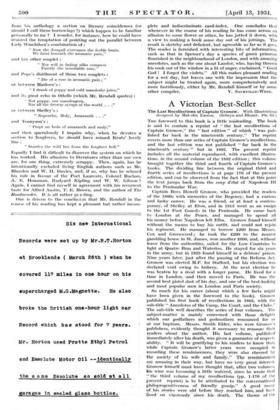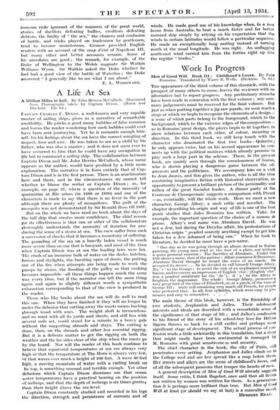A Victorian Best-Seller
The Last Recollections of Captain Gronow. With Illustrations designed by Malcolm Easton. (Selwyn and Blount. 10s. 6d.)
THE foreword to this book is a little 'misleading. The book is said to contain a reprint of "the last recollections of Captain Gronow," the "last edition" of which "was pub- lished far back in the nineteenth century." The reprint covers more than one series of Captain Gronow's recollections, and the last edition was not published "far back in the nineteenth century'" but in 1892. The present reprint includes all the material reproduced, with excellent illustra- tions, in the second volume of the 1892 edition ; this volume brought together the third and fourth of Captain Gronow's books. The dividing line between the Original third and fourth series of recollections is at page 170 of the present edition, and can be observed from the fact that at this point the text jumps back from the coup d'etat of Napoleon III to the Peninsular War.
Captain Rees Howell Gronow, who provided the readers of the 1860s with memories of the Regency, had a curious and lucky career. He was a friend, or at least a contem- porary, of Shelley at Eton, and in 1813 went as an ensign to the 1st Foot Gutud-s in the Peninsula. He came back to London at the Peace, and managed to spend all his money before Napoleon left Elba. Gronow found himself without the means to buy his outfit, and could not rejoin his regiment. He managed to borrow 1200 from Messrs. Cox and Greenwood; he took the 1200 to the nearest gambling house in St. James, won another £600, and, without leave from the authorities, sailed for the Low Countries to fight at Quatre Bras and Waterloo. He stayed for six years in the army, but in 1823 found himself in a debtors' prison. Nine years later, just after the passing of the Reform Act, Gronow was elected M.P. for Stafford, but his election was declared void owing to bribery. At the next election he was beaten by a rival with a longer purse. He lived for a time in London, and then moved to Paris. He was the second best pistol shot of his day, and one of the best-looking and most popular men in _London and Paris society.
So much for his career (about which a few facts might have been given in the foreword to the book). Gronow published his first book of recollections in 1862, with the sub-title "Anecdotes of the Camp, the Court, and the Clubs." The sub-title well describes the series of four volumes. The subject-matter is mainly concerned with those delights which our godfathers and godmothers renounced for us at our baptism. Messrs. Smith Elder, who were Gronow's publishers, evidently thought it necessary to reassure their readers about the author. His last volume, published immediately after his death, was given a guarantee of respect- ability. "It will be gratifying to his readers to know that, while Captain Gronow's latter years were occupied in recording these reminiscences, they were also cheered by the society of his wife and •family." The reminiscences are amusing in their way, but have no very great interest. Gronow himself must have thought that, after two volumes, his wine was becoming a little watered, since he wrote that " the third volume of my recollections (pp. 1-170 of the present reprint) is to be attributed to the conversational philoprogenitiveness of friendly gossip." A good many of his stories were old before they reached him, and have lived on vigorously since his death. The theme of the nouveau riche ignorant of the manners of the great world, stories of duelists defeating bullies, creditors defeating debtors, the frailty of "the sex," the chances and confusion of battle, and tricks played on tradesmen by gentlemen, tend to become monotonous. Gronow provided English readers with an account of the coup d'etat of Napoleon III, but many other and better accounts remain. Some of his anecdotes are good : the remark, for example, of the Duke of Wellington to the Welsh magnate Sir Watkin Williams Wynn. Sir Watkin asked- the Duke whether he had had a good view of the battle of Waterloo ; the Duke answered "1 generally like to see what I am about."
E. L. WOODWARD.

















































 Previous page
Previous page